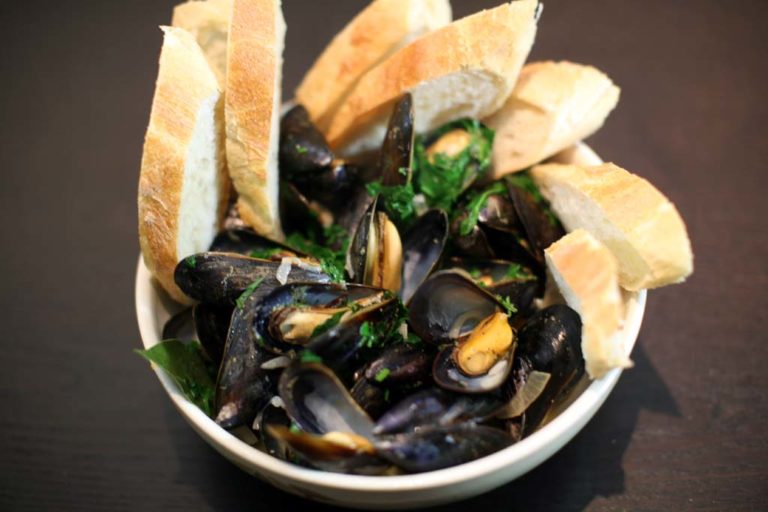
Chef's notes:
The mussel is a bivalve mollusk that lives in both salt and freshwater. There are two species you will expect to find at the grocery store when you go looking for mussels. The first is the North Atlantic blue mussel, and this is the most common mussel. Generally, the blue mussel is in season from May to July. The second common mussel is the Mediterranean mussel, also known as the Bay mussel. It looks very similar to the other blue mussel, but the Mediterranean’s shell may be broader. The Mediterranean mussel is generally in season from February to May.
I am fairly certain that what I am cooking here are Mediterranean mussels because it’s March, they are alive, and they are wider than what I am used to. But that is totally irrelevant because I will cook them just like I always cook mussels, and that is Moules Marinières, which is boiling them in beer, cider, or wine with tasty stuff. Then I will eat them with yummy French bread to soak up the broth. Oh, baby. This is gonna be good.
Ingredients
- 1½ pounds mussels
- 1¼ cups hard cider
- ¾ cup water
- ¼ cup unsalted butter, softened
- ¼ cup shallots, chopped
- ¾ cup parsley, chopped
- 1 Tbsp lemon zest
- 2 tsp sea salt
- Black pepper
- Bay leaf
- Slice of lemon
Fresh Mediterranean Mussels Boiled with Hard Cider, Butter, Shallots, Herbs, and Lemon
- Clean the mussels. Use a stiff brush or scrubby to remove anything stuck to the shell. If you have a lot of stuff stuck to the shell like the mussel in this picture, use an old paring knife and scrape it off. Make sure to rinse the mussels under cool water to get all the scrapings off. If you are prepping ahead for a later meal, don’t remove the beard yet, which are the strings coming out of the shell. Remove them just before you cook the mussels. If you are having trouble gripping the beard, use a dry towel to hold them.
- Get the other ingredients ready. I have always found that having all my ingredients in small, ready-to-use bowls to be the easiest way to cook, especially something like mussels that cooks in only a few minutes. For this recipe, use a large frying pan—large enough to fit all the mussels—with a lid. Begin by melting 4 Tbsp, or 1/8 pound, of unsalted butter in the pan. Add the shallots and the lemon zest, and sauté them over low heat until the shallots soften, about 3 minutes.
- Crank up the heat and add the mussels. Turn the heat all the way up to high and add the mussels right away. Then add the 1¼ cups hard cider, ¾ cup water, 2 tsp salt, bay leaf, and the black pepper to taste. Give the pan a quick stir, cover it, and boil the mussels for about 4–5 minutes. Some of them may begin to turn yellow or orange, and some will stay white. But they should all be cooked after 5 minutes.
- Remove the mussels and finish the sauce. Use a slotted spoon to remove the mussels from the liquid. Turn off the heat. At this point, you have the option of adding some parsley or whatever herb you like. But for sure add the other 4 Tbsp of butter. Use a whisk to emulsify it into the sauce. Finally, taste the sauce, adjust the salt as needed, and dump it over the mussels. Finally, squirt a little lemon juice over the whole thing. Serve immediately with some sliced baguette or other light artisan bread.
Tips & Tricks
- Dirty mussels are a pain to clean. Buy clean-looking ones if you can.
- Live mussels should feel lively and heavy. Don’t buy light, hollow-feeling ones.
- If the mussels don’t close their shells when you touch them or tap on their shell, they are dead. Throw them away.
- If a lot of the mussels at the store are gaping open, don’t buy them. They are super old, weak, and dead or dying. You should raise this issue with the store manager. Tell them fresh, live mussels shouldn’t gape.
- Mussels should smell like the sea—salty and slightly fishy—and not foul.
- Store mussels in a colander in the fridge over a container to catch what may leak out of the shell. Throw that liquid away. Don’t store mussels in plastic.
- Don’t soak mussels in water. Tap water will totally kill them.
